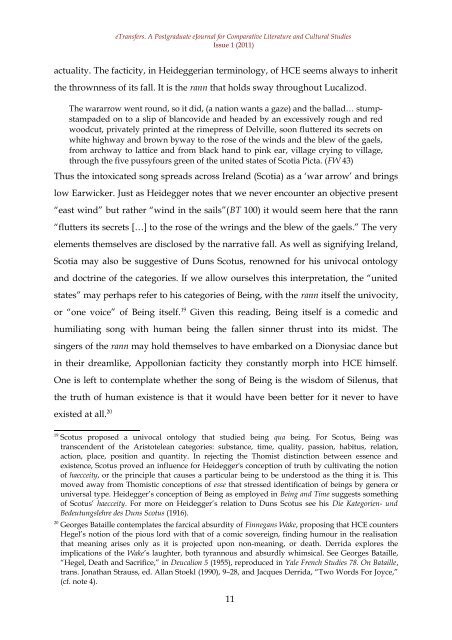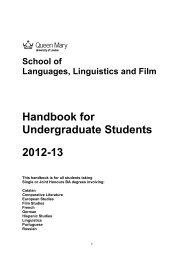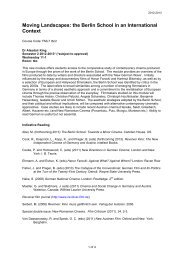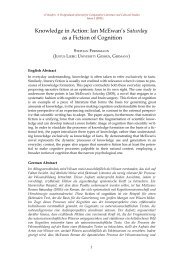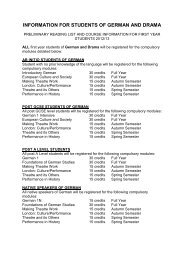Finnegans Wake - Queen Mary, University of London
Finnegans Wake - Queen Mary, University of London
Finnegans Wake - Queen Mary, University of London
Create successful ePaper yourself
Turn your PDF publications into a flip-book with our unique Google optimized e-Paper software.
eTransfers. A Postgraduate eJournal for Comparative Literature and Cultural Studies<br />
Issue 1 (2011)<br />
actuality. The facticity, in Heideggerian terminology, <strong>of</strong> HCE seems always to inherit<br />
the thrownness <strong>of</strong> its fall. It is the rann that holds sway throughout Lucalizod.<br />
The wararrow went round, so it did, (a nation wants a gaze) and the ballad… stumpstampaded<br />
on to a slip <strong>of</strong> blancovide and headed by an excessively rough and red<br />
woodcut, privately printed at the rimepress <strong>of</strong> Delville, soon fluttered its secrets on<br />
white highway and brown byway to the rose <strong>of</strong> the winds and the blew <strong>of</strong> the gaels,<br />
from archway to lattice and from black hand to pink ear, village crying to village,<br />
through the five pussyfours green <strong>of</strong> the united states <strong>of</strong> Scotia Picta. (FW 43)<br />
Thus the intoxicated song spreads across Ireland (Scotia) as a ‘war arrow’ and brings<br />
low Earwicker. Just as Heidegger notes that we never encounter an objective present<br />
“east wind” but rather “wind in the sails”(BT 100) it would seem here that the rann<br />
“flutters its secrets […] to the rose <strong>of</strong> the wrings and the blew <strong>of</strong> the gaels.” The very<br />
elements themselves are disclosed by the narrative fall. As well as signifying Ireland,<br />
Scotia may also be suggestive <strong>of</strong> Duns Scotus, renowned for his univocal ontology<br />
and doctrine <strong>of</strong> the categories. If we allow ourselves this interpretation, the “united<br />
states” may perhaps refer to his categories <strong>of</strong> Being, with the rann itself the univocity,<br />
or “one voice” <strong>of</strong> Being itself. 19 Given this reading, Being itself is a comedic and<br />
humiliating song with human being the fallen sinner thrust into its midst. The<br />
singers <strong>of</strong> the rann may hold themselves to have embarked on a Dionysiac dance but<br />
in their dreamlike, Appollonian facticity they constantly morph into HCE himself.<br />
One is left to contemplate whether the song <strong>of</strong> Being is the wisdom <strong>of</strong> Silenus, that<br />
the truth <strong>of</strong> human existence is that it would have been better for it never to have<br />
existed at all. 20<br />
19 Scotus proposed a univocal ontology that studied being qua being. For Scotus, Being was<br />
transcendent <strong>of</strong> the Aristotelean categories: substance, time, quality, passion, habitus, relation,<br />
action, place, position and quantity. In rejecting the Thomist distinction between essence and<br />
existence, Scotus proved an influence for Heidegger's conception <strong>of</strong> truth by cultivating the notion<br />
<strong>of</strong> haecceity, or the principle that causes a particular being to be understood as the thing it is. This<br />
moved away from Thomistic conceptions <strong>of</strong> esse that stressed identification <strong>of</strong> beings by genera or<br />
universal type. Heidegger’s conception <strong>of</strong> Being as employed in Being and Time suggests something<br />
<strong>of</strong> Scotus’ haecceity. For more on Heidegger’s relation to Duns Scotus see his Die Kategorien- und<br />
Bedeutungslehre des Duns Scotus (1916).<br />
20 Georges Bataille contemplates the farcical absurdity <strong>of</strong> <strong>Finnegans</strong> <strong>Wake</strong>, proposing that HCE counters<br />
Hegel’s notion <strong>of</strong> the pious lord with that <strong>of</strong> a comic sovereign, finding humour in the realisation<br />
that meaning arises only as it is projected upon non-meaning, or death. Derrida explores the<br />
implications <strong>of</strong> the <strong>Wake</strong>’s laughter, both tyrannous and absurdly whimsical. See Georges Bataille,<br />
“Hegel, Death and Sacrifice,” in Deucalion 5 (1955), reproduced in Yale French Studies 78. On Bataille,<br />
trans. Jonathan Strauss, ed. Allan Stoekl (1990), 9–28, and Jacques Derrida, “Two Words For Joyce,”<br />
(cf. note 4).<br />
11


